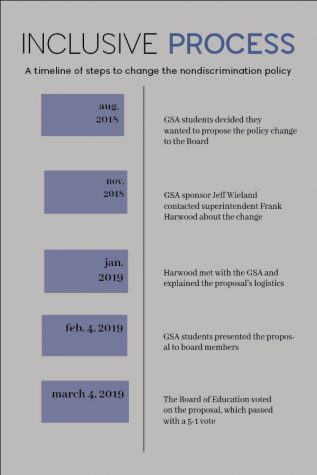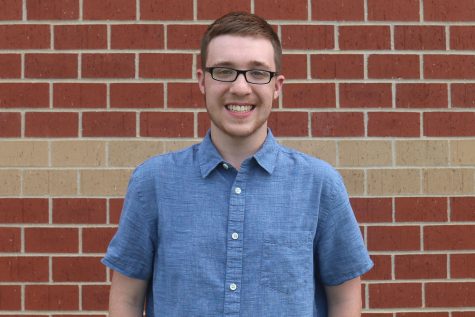Board of Education passes GSA’s nondiscrimination policy change proposal in 6-to-1 vote
The policy now includes the phrases “gender identity” and “sexual orientation”
At the Board of Education meeting on Monday, March 4, board member Mitch Powers voices his concerns to the board and audience members. “I get concerned about the risk that [will be] taken on by [USD 232] if we were to pass it,” Powers said.
March 22, 2019
With a 6-to-1 vote, the Board of Education passed the GSA proposal to add the phrases “gender identity” and “sexual orientation” to the district’s nondiscrimination policy. This decision puts our nondiscrimination policy on par with other districts such as the Topeka and Kansas City, Missouri school districts who have already implemented these measures.
Before the change, the nondiscrimination policy included race, nationality, gender and national identity.
 For GSA representative senior Alicia Ratzloff, the additions to the nondiscrimination policy, make the district more inclusive.
For GSA representative senior Alicia Ratzloff, the additions to the nondiscrimination policy, make the district more inclusive.
“[The change] tells people that the outlying people of [the LGBTQ] community are part of Mill Valley, [and] are a part of the district as a whole,” Ratzloff said.
GSA president junior Madelynn Hodes is happy to see the GSA making meaningful change.
“It is nice to know … we were able to leave something behind at this school that will hopefully pave the way to making bigger changes, [and] to making future students feel more safe and accepted,” Hodes said.
GSA sponsor Jeff Wieland feels the district took a step in the right direction.
“[The policy change is] a big accomplishment, a step forward for our district,” Wieland said.
Wieland was also happy with the district’s willingness to change.
“[The Board] is positive towards it, and very complimentary of the kids who presented,” Wieland said.
The policy change is not something that happened over night. The GSA has been talking about the change for many years and Wieland was pleased to see students fight for it.
“It was an issue [the GSA] had talked about previously … because it was something students were aware of, … but this is the first year students really took the initiative to act,” Wieland said.
Superintendent Frank Harwood is hoping that this policy will be able to better suit all students.
“The most important [takeaway] is we want our policies to be inclusive of all of our students,” Harwood said. “There is not necessarily a problem going on, but [we want] people to feel included and be part of our community.”
For Wieland, the ease of the process encouraged the students to go through with the proposal.
“It was a simpler process than you would think,” Wieland said. “It really just takes students asking.”
Wieland also felt that the proposal was something that needed to be student-led.
“I thought it was important that it came from the students,” Wieland said. “I’m [just] there to guide them.”
Harwood is glad that students are being active in board policy.
“We encourage [student policy change proposals] because the policies we have are meant to be there for students, staff and families,” said Harwood. “It shows this is not just something that we are doing because we have to, but because it really makes a difference.”
Wieland was happy with Harwood’s help through the process.
“Mr. Harwood actually came and met with the GSA, … [and] talked to them a little bit about what they wanted to achieve, and … what would need to happen,” Wieland said. “It was through the help of the superintendent … [that] it ended up on the Board agenda.”
While most board members supported the policy, board member Mitch Powers felt the policy wasn’t defined enough to pass.
“I think though when you start looking at the worst case scenario and the unintended consequences … I get concerned about some of the realities of the situation,” Powers said. “For the most part, I am really concerned that there is no act of law … that defines what discrimination means in these particular cases.”
Powers was also concerned about the Kansas Associations of School Board’s recommendation to not add additional protected classes to the the nondiscrimination policy because it could open the district up to more lawsuits.
On the other hand, board member Kevin Makalous voted for the bill because he felt it was the right thing to do.
“We have an opportunity here as leaders in the community to affirmatively acknowledge that these two classes of students deserve our acknowledgement and our recognition that they are protected as students and employees within … this district,” Makalous said. “For me, it is critically important that we send that message.”
For Harwood, the district is currently following the proposed changes meaning the district will not be open to more lawsuits.
“I don’t see us discriminating against anybody anyway so I don’t see that we would be taking on any additional liability in that regard,” Harwood said.
The change is a movement, not a reaction to an ongoing problem, according to Hodes.
“At this point in time, it really is just a symbolic thing,” Hodes said. “It is sort of a first step … saying ‘hey, we are not okay with mistreatment.’”
For Ratzloff, the change is important to make sure everyone feels like they belong.
“It allows the LGBTQ community [to feel] more comfortable,” Ratzloff said. “Not only does this stretch to students, it stretches to staff … [and] teachers who are in the community.”



![At the Board of Education meeting on Monday, March 4, board member Mitch Powers voices his concerns to the board and audience members. “I get concerned about the risk that [will be] taken on by [USD 232] if we were to pass it,” Powers said.](https://www.mvnews.org/wp-content/uploads/2019/03/HR_BOE_0008_EDIT_WEB-900x600.jpg)








